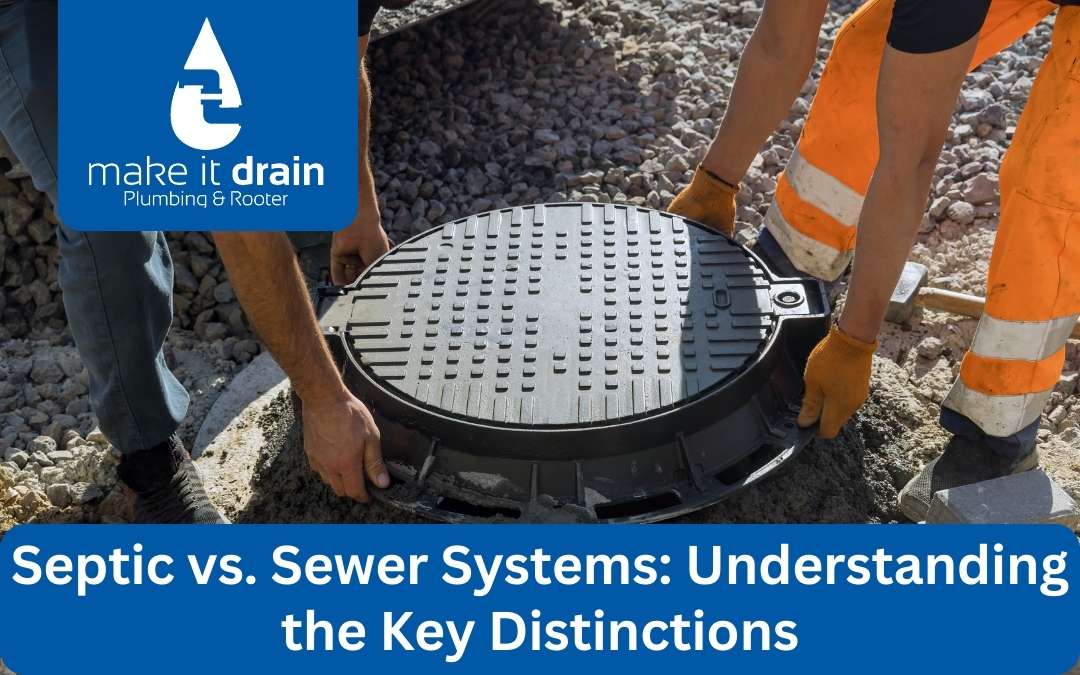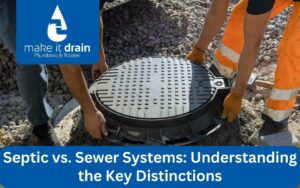Understanding the key distinctions between septic and sewer systems is essential for homeowners, as it affects the maintenance, costs, and environmental impact of disposing of household waste water. Here’s a list of descriptions to help distinguish between the two systems:
Septic Systems
On-Site Waste Treatment
Septic systems are individual waste treatment systems installed on the property. They treat and dispose of household wastewater on-site, without relying on municipal sewer lines.
Components
A typical septic system consists of a septic tank and a drainfield. The septic tank separates solids from liquids, allowing bacteria to break down organic matter, while the drainfield disperses the treated water back into the ground.
Maintenance Responsibility
Homeowners are responsible for the maintenance of their septic systems. This includes regular inspections, pumping the septic tank every 3-5 years, and ensuring that nothing harmful is flushed or drained that could disrupt the system’s balance.
Costs
While there is no monthly fee for using a septic system, the upfront installation cost can be high, and homeowners must budget for regular maintenance and potential repairs.
Environmental Impact
Septic systems can be environmentally friendly, as they recharge local water tables. However, if not properly maintained, they can contaminate groundwater with nitrates and bacteria.
Sewer Systems
Municipal Waste Treatment
Sewer systems are provided and maintained by local municipalities. Homes connected to a sewer system send their wastewater to a central treatment facility.
Infrastructure
Sewer systems rely on extensive underground piping and municipal treatment plants. These systems are designed to handle large volumes of wastewater from multiple properties.
Maintenance Responsibility
The municipality is responsible for the maintenance of the sewer lines and the treatment facility. Homeowners are responsible for the maintenance of the plumbing lines to the connection point on their property.
Costs
Homeowners connected to a municipal sewer system typically pay a monthly or quarterly fee based on their water usage or a flat rate. This fee contributes to the operation and maintenance of the sewer system.
Environmental Impact
Modern sewer systems are designed to treat wastewater effectively before releasing it back into the environment. However, aging infrastructure, overflows, and system failures can lead to environmental pollution.
Key Distinctions
Location and Scale
Septic systems are individual and localized, while sewer systems are centralized and serve many homes or an entire community.
Maintenance and Responsibility
Septic system maintenance falls on the homeowner, whereas sewer system maintenance is primarily the municipality’s responsibility.
Cost Implications
Septic systems require a higher initial investment and periodic maintenance costs, whereas sewer systems involve ongoing utility fees.
Environmental Considerations
Both systems have environmental impacts, but properly maintained septic systems can benefit local ecosystems by replenishing groundwater.
Whether you’re navigating the decision between a septic vs. sewer system for your home, or you need assistance in understanding and maintaining your current setup, the expertise of a professional plumbing service is invaluable. Each system has its own set of requirements, benefits, and considerations, and making the right choice can significantly impact your property’s functionality and environmental footprint.
🛠️ Need Expert Guidance?
Don’t let the complexities of waste disposal systems overwhelm you. Contact Make It Drain Plumbing & Rooter today for expert assistance and peace of mind knowing your property is in capable hands. Let us help you make informed decisions and provide the support you need for all your plumbing concerns.






